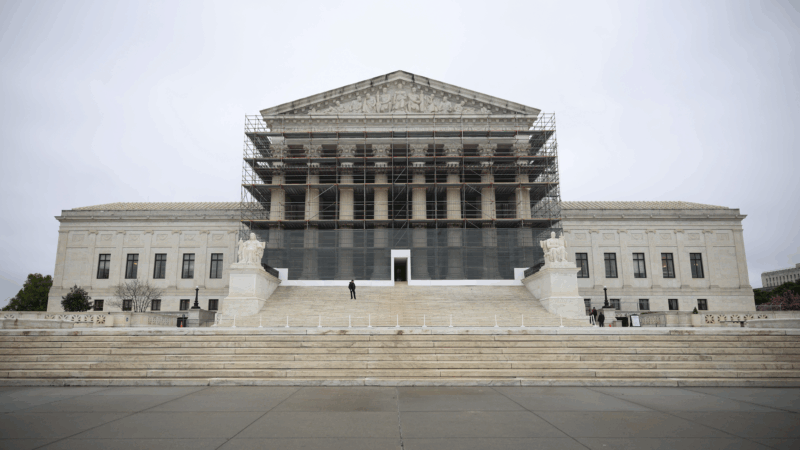Supreme Court leans toward parents who object to LGBTQ books in public schools
The conservative Supreme Court majority seemed more than ready Tuesday to tell public school districts that they must allow parents to pull their kids out of certain classes because the course material conflicts with the parents’ religious views.
At the center of the case is the school system in Montgomery County, Md., the most religiously diverse county in the U.S., with 160,000 students of almost all faiths. Beginning a few years ago, the county, which includes a substantial number of gay and lesbian parents, adopted a curriculum for elementary school students. It was aimed at promoting respect for LGBTQ+ parents and their children by including story books with gay and lesbian characters.
Some parents, however, objected and asked to opt their children out of elementary school classes where the books were included in the curriculum. The schools initially tried an opt-out plan, but found it was a logistical nightmare.
The religious parents then sued the school board. They asserted that by exposing their children to ideas that conflict with the parents’ faith, and thus forcing them to withdraw their children from public school, the board was violating the Constitution’s guarantee to the free exercise of religion.
The school board won in the lower courts but at the Supreme Court Tuesday, the board got little love from the court’s six conservative justices.
Leading the charge for the religious parents was lawyer Eric Baxter, who got a grilling from the court’s three liberal justices. Justice Sonia Sotomayor pointed to one of the books that is objectionable to some parents, a book called Uncle Bobby’s Wedding about a girl who goes to her uncle’s same-sex wedding.
Sotomayor pressed Baxter on his argument. “So what you’re saying is that the exposure of children to the fact that two people of the same sex are getting married is coercion?” she asked.
Baxter’s answer was essentially: Yes.
That prompted conservative Justice Samuel Alito to observe that the book has a clear moral message “that a lot of people who hold on to traditional religious beliefs don’t agree with.”
Liberal justice Elena Kagan followed up, asking what rule the court should adopt. Is it your position, Kagan asked, that any time a student confronts something their parents disagree with, they can opt out of a class?
Baxter repeatedly declined to say where he would draw the line, prompting Kagan to ask whether “this is a rule that applies as well to a 16-year-old in biology… [if] the parents say, ‘I don’t want my child to be there for the classes on evolution or on other biological matters which conflict with my religion?'”
Sotomayor said that she has a whole list of items that conflict with some people’s religious views, including “biographical material about women who have been recognized for achievements outside of their home… divorce, interfaith marriage, or immodest dress.”
Indeed, that kind of a rule, interjected Kagan, would allow “opt-outs for everyone.”
Justice Amy Coney Barrett pressed Baxter on his failure to draw any line. At what point, she asked, is the school district imposing a burden on religious parents? Is it the mere exposure to ideas or something more?
And Justice Ketanji Brown Jackson asked whether parents should be free to opt their kids out of a class if a gay teacher keeps his wedding photo on his desk.
Representing the school board, lawyer Alan Schoenfeld fielded relentless questioning from the court’s conservatives.
Justices Alito, Brett Kavanaugh and Neil Gorsuch were the most vociferous.
Justice Kavanaugh noted that he had been raised in Montgomery County, and though he didn’t go to public schools, he pressed lawyer Schoenfeld as to why opt-outs are not feasible. Schoenfeld said that elementary school classrooms are not like a health and sexuality classes, where state law allows a student to opt out from the whole class. In contrast, in grade school, students operate very differently, he said. They can pull books from the shelves, and read them to each other, or ask the teacher about the book.
“It’s mayhem,” said Schoenfeld in a moment of candor. “And the ability of teachers to manage the line between what is curriculum content coming directly from the teacher and coming indirectly from the sort of socialization in the classroom, I think, is very hard to draw.”
Justice Alito was not satisfied, repeatedly asking Schoenfeld what his answer is to the concerns of the religious parents. “Basically,” said Alito, “your answer is: ‘It’s just too bad.'”
“My answer,” replied Schoenfeld, “is that… the school board here is democratically elected. The entire process of adopting this curriculum is open and transparent.”
A decision in the case is expected by summer.
Supreme Court blocks redrawing of New York congressional map, dealing a win for GOP
At issue is the mid-term redrawing of New York's 11th congressional district, including Staten Island and a small part of Brooklyn.
Video of Clinton depositions in Epstein investigation released by House Republicans
Over hours of testimony, the Clintons both denied knowledge of Epstein's crimes prior to his pleading guilty in 2008 to state charges in Florida for soliciting prostitution from an underage girl.
Some Middle East flights resume, but thousands of travelers are still stranded by war
Limited flights out of the Middle East resumed on Monday. But hundreds of thousands of travelers are still stranded in the region after attacks on Iran by the U.S. and Israel.
‘Hamnet’ star Jessie Buckley looks for the ‘shadowy bits’ of her characters
Buckley has been nominated for a best actress Oscar for her portrayal of William Shakespeare's wife in Hamnet. The film "brought me into this next chapter of my life as a mother," Buckley says.
How, who, and why: NPR flips its famous letters to defend the right to be curious
NPR is standing up for the public's right to ask hard questions in a national campaign dubbed "For your right to be curious." At NPR's headquarters, on billboards in New York City, Chicago, and Washington, D.C., and across social media, NPR's three iconic letters transform into "how," "who," and "why" — a bold declaration of its commitment to fight for Americans' right to ask questions both big and small.
Oil prices surge, but no panic yet, as Iran war continues
Global oil prices are in the high $70s as traffic through Strait of Hormuz comes to a halt. Some analysts have warned they could top $100 a barrel if the stoppage is prolonged.







